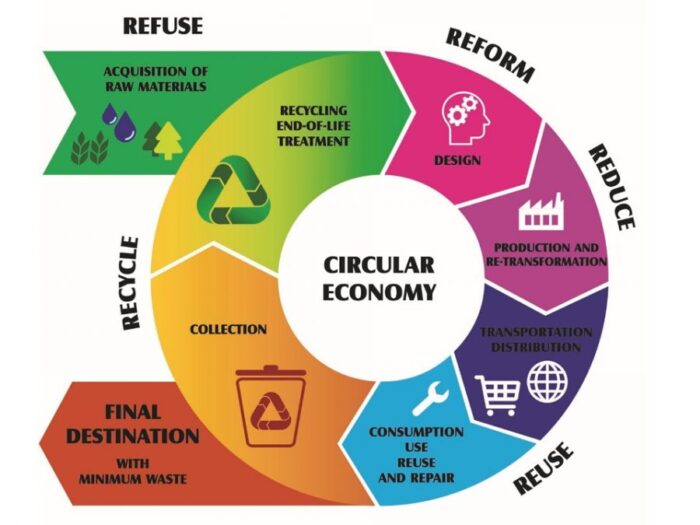Circular economy resale trust is the foundation for a sustainable future where secondhand goods are valued and trusted. It’s about building confidence in a system that keeps products in circulation, minimizing waste and maximizing resources. This shift in consumer mindset is crucial for a thriving resale market, and it’s happening now.
Imagine a world where buying secondhand is not just an option, but a preferred choice. Where consumers are confident in the quality and authenticity of pre-owned items, knowing they’re contributing to a more sustainable and ethical way of living. This is the vision of a circular economy, where resale trust is the cornerstone of success.
Resale Trust Mechanisms
In the circular economy, trust is paramount. Consumers need to be confident in the authenticity and quality of secondhand goods to embrace the resale market. This requires robust mechanisms that ensure product integrity and build trust in the entire resale ecosystem.
Independent Certification Bodies
Independent certification bodies play a crucial role in verifying the authenticity and quality of secondhand goods. These organizations establish standards and procedures for assessing products, ensuring they meet specific criteria. For example, organizations like Fair Trade Certified or Global Organic Textile Standard (GOTS) provide certifications for products that meet their ethical and sustainable standards. These certifications provide consumers with a trusted source of information about the origin, quality, and environmental impact of secondhand goods.
- Verification Process: Independent certification bodies conduct audits and inspections to ensure that products meet their standards. This may involve verifying the origin of materials, production processes, and product quality.
- Transparency and Accountability: Certification bodies often provide detailed information about their standards and verification process, ensuring transparency and accountability in their assessments.
- Building Trust: Independent certifications help build trust among consumers by providing a third-party guarantee of product authenticity and quality.
Product Authentication Technologies
Technology plays a vital role in verifying product authenticity. Various technologies can be used to authenticate secondhand goods, ensuring they are genuine and not counterfeit.
- RFID Tags: Radio Frequency Identification (RFID) tags can be attached to products, allowing for tracking and verification of their authenticity. These tags can be scanned to verify the product’s origin and history.
- Blockchain Technology: Blockchain technology provides a secure and transparent platform for recording and verifying product information. This can help track the provenance of secondhand goods, ensuring their authenticity.
- Digital Watermarking: Digital watermarks can be embedded within images or product packaging to verify their authenticity. These watermarks can be used to detect counterfeit products and ensure the product’s origin.
Seller Reputation Systems, Circular economy resale trust
Seller reputation systems play a critical role in building trust in the resale market. These systems allow buyers to evaluate the credibility and trustworthiness of sellers based on their past performance and customer feedback.
- Rating and Review Systems: Platforms like eBay, Etsy, and Depop have rating and review systems that allow buyers to rate sellers based on their experience. This provides valuable information to potential buyers about the seller’s reliability and product quality.
- Feedback Mechanisms: Seller reputation systems often include feedback mechanisms that allow buyers to leave detailed reviews and comments about their experience with specific sellers. This provides valuable insights into the seller’s trustworthiness and product quality.
- Verification and Authentication: Some platforms have verification processes that authenticate sellers and their products, ensuring their legitimacy and building trust among buyers.
Comparing and Contrasting Methods
Different methods for verifying product authenticity and quality have their own advantages and disadvantages.
- Independent Certification Bodies: Provide a robust and reliable third-party assessment of product quality and authenticity, but can be costly and time-consuming for sellers.
- Product Authentication Technologies: Offer a secure and efficient way to verify product authenticity, but can be expensive to implement and may not be accessible to all sellers.
- Seller Reputation Systems: Provide a cost-effective way to build trust through customer feedback and reviews, but may be susceptible to manipulation and fraud.
The Role of Technology in Resale Trust
The resale market is rapidly evolving, driven by consumer demand for sustainable and affordable options. Technology plays a crucial role in building trust and transparency within this dynamic ecosystem.
Transparency and Accountability Through Technology
Technology empowers consumers and businesses alike to build trust in the resale market by providing a transparent and verifiable record of transactions and product information. This can be achieved through:
- Online platforms and marketplaces: Platforms like eBay, Depop, and ThredUp offer features like seller ratings, buyer reviews, and detailed product descriptions, allowing users to assess the legitimacy of sellers and products. These platforms also often provide escrow services, ensuring secure payment and delivery.
- Product authentication services: Companies like Entrupy and RealReal utilize AI-powered image recognition and expert authentication to verify the authenticity of luxury goods, reducing the risk of counterfeit products.
- Digital product passports: These digital records contain detailed information about a product’s origin, materials, and manufacturing process, allowing consumers to trace its journey and understand its sustainability credentials.
Blockchain Technology for Provenance Tracking and Authenticity Verification
Blockchain technology offers a secure and immutable platform for tracking product provenance and verifying authenticity.
- Immutable record-keeping: Each transaction on a blockchain is recorded permanently, making it impossible to alter or delete data. This ensures a transparent and verifiable history of a product’s journey.
- Decentralized and secure: Blockchain networks are decentralized, meaning they are not controlled by any single entity. This makes them highly resistant to manipulation or fraud.
- Smart contracts: These automated agreements can be used to enforce conditions related to product authenticity, provenance, and resale terms, enhancing trust and accountability.
“Blockchain technology has the potential to revolutionize the resale market by creating a system of trust and transparency that is unparalleled in traditional commerce.” – [Source]
Innovative Platforms and Applications
Several innovative platforms and applications are leveraging technology to build trust in the resale market.
- Circularise: This platform uses blockchain technology to track the lifecycle of products, enabling consumers to trace their journey from manufacturing to resale. It also provides a platform for companies to share information about their sustainability practices.
- Provenance: This platform allows consumers to scan a product’s QR code to access its provenance information, including its origin, materials, and manufacturing process.
- The RealReal: This luxury consignment platform uses AI-powered image recognition and expert authentication to verify the authenticity of luxury goods, providing consumers with confidence in their purchases.
Resale Trust and Consumer Behavior: Circular Economy Resale Trust
The resale market is a growing segment of the economy, fueled by a rising awareness of sustainability and a desire for affordability. Trust plays a pivotal role in driving consumer behavior in this space. When consumers trust the resale market, they are more likely to purchase secondhand goods, leading to a more circular economy.
Factors Influencing Resale Purchases
Consumers are driven by a variety of factors when choosing to buy secondhand goods. These motivations can be categorized into three main areas:
- Sustainability: Consumers are increasingly aware of the environmental impact of fast fashion and overconsumption. Purchasing secondhand goods allows them to reduce their carbon footprint and contribute to a more sustainable lifestyle.
- Affordability: Resale offers consumers access to high-quality items at a lower price point. This is especially appealing to younger generations and individuals with limited budgets.
- Uniqueness: The resale market offers a diverse range of products, including vintage and rare items, that cannot be found in traditional retail settings. This appeals to consumers seeking unique and distinctive pieces.
Challenges and Opportunities for Building Trust
Building trust in the resale market is crucial for its continued growth. Different consumer segments have unique concerns and expectations:
- Millennials and Gen Z: These generations are digitally savvy and rely heavily on online reviews and social media recommendations. Building trust requires transparent product descriptions, high-quality images, and a robust customer service system.
- Older Generations: These consumers may be more hesitant to embrace the resale market due to concerns about product quality and authenticity. Building trust requires clear return policies, detailed product descriptions, and a focus on building relationships with reputable sellers.
- Luxury Consumers: This segment values authenticity and exclusivity. Building trust requires a focus on high-quality items, expert authentication services, and a curated selection of products.
Building a robust circular economy resale trust requires a collaborative effort from businesses, consumers, and technology providers. By embracing transparency, utilizing innovative technologies, and promoting responsible practices, we can create a future where secondhand goods are not only valued but actively sought after. The journey towards a circular economy is paved with trust, and it’s a journey we must embark on together.
The circular economy is all about keeping things in use for longer, and resale trust is a key part of that. It’s about building confidence in buying pre-owned goods, and that’s where things get interesting. Take Lenovo’s fully transparent laptop concept , for example. While the idea is cool, it might be a bit too transparent for some, and the real question is whether it actually builds trust in the resale market.
If we can find ways to make pre-owned products feel as good as new, then we’re one step closer to a truly circular economy.
 Standi Techno News
Standi Techno News

